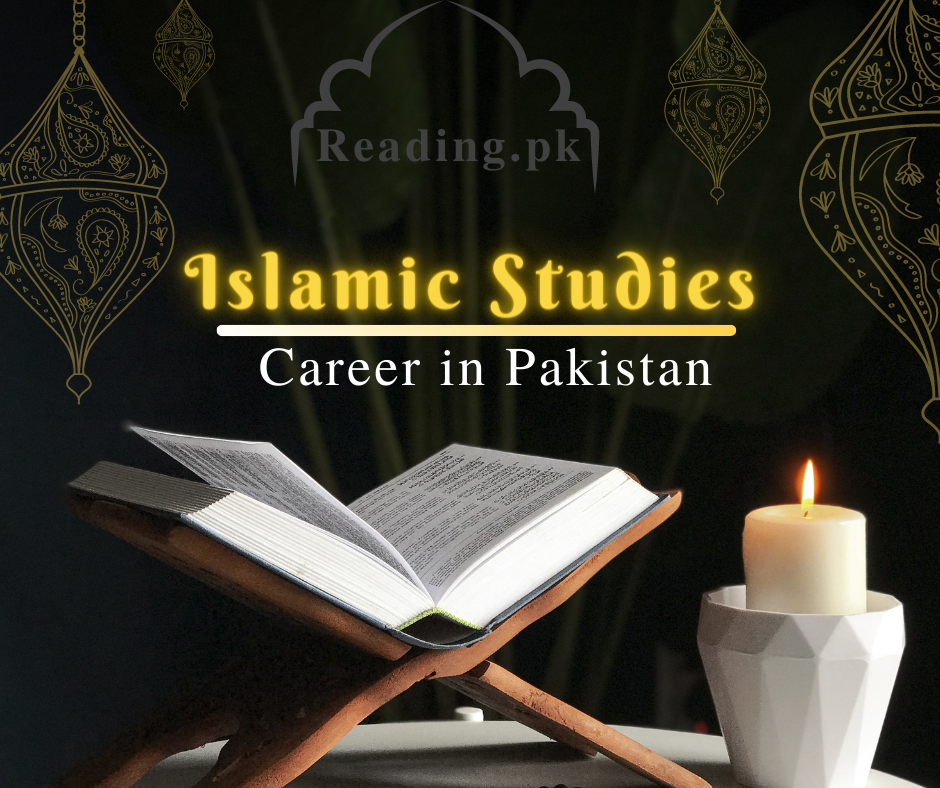Are you interested in Pakistan Studies and want to start a career in this field? Here you can get all information regarding Islamic Studies career in Pakistan and foreign countries. This article will also highlight the Islamic Studies scope in Pakistan as well as the importance of these courses. Learn about Islamic Studies, its career, scope, courses, eligibility, requirements, skills, overview, subjects, and objectives. There are various opportunities to start an Islamic Studies career in Pakistan in multiple fields. Islam is the national religion of Pakistan that’s why Islamic Studies has a major role in each department of the Government of Pakistan.
Read this article till the end to get details for the career of Islamic Studies/Islamiat in Pakistan. Islamic Studies refers to the academic study and application of Islam. It also includes academic multidisciplinary studies programs that examine the history, texts, and theologies of other religions, such as Eastern Christian Studies or Jewish Studies, and areas such as environmental studies, Middle East studies, and race studies. The forum is where scholars from different disciplines (history, literature, culture, and art) can meet to exchange ideas about the subject matter. Islamic studies are the study of Islam. Two perspectives can be used to interpret Islamic studies.
[lwptoc]
Islamic Studies
Islamic Studies offers a multidisciplinary approach to all aspects of Islam and the Islamic world. This discipline combines theoretical and comparative methods used in modern academic studies of Islam. Islamic Studies combine historical information with religious and cultural studies and philosophical thought. Islamic Studies includes information about the Arab-Islamic civilization.
This consists of the major defining features, society, and culture of the Ottoman Empire. Through history, students can also learn about cultural convergence and linguistic divergence in the Islamic world. Other classes include the Middle East crisis, the Quran, its interpretations, and the religion of Islam.
Carole Hillenbrand defines Islamic Studies as “a discipline which seeks to understand what the Islamic World has accomplished in the past, and what the future holds.”
A variety of academic Islamic Studies programs offer historical studies of Islam, including Islamic history and historiography, Islamic law, Islamic Theology, Islamic philosophy, and Islamic civilization. Islamic Studies specialists focus on the academic study of Arabic texts within Islamic Theology, Islamic Law, the Qur’an, Hadith, and other ancillary disciplines like Tafsir and Qur’an Exegesis. They also use methods from ancillary fields, such as Biblical Studies and Classic Philology, World History, Modern History, and Sociology.
Islamic Studies Career in Pakistan | Courses, Scope and Jobs

Islamic education Scope in Pakistan
The career opportunities in Pakistan for Islamic Studies are very varied. Islamic Studies is not only a course that can be used to develop your career but also a comprehensive program for self-development. This subject is extensively studied for social and personal reforms. There is no notion of priesthood in Islam. All Muslims must learn the basics of Islam. While Islamic Studies is a compulsory subject at the bachelor’s degree level in Pakistan, it can be taken as an elective subject in the Intermediate if you wish to learn more about Islam. MA, MS/Philosophy, and Ph.D in Islamic Studies will make you a religious authority.
Unfortunately, our Madrassas do not teach the complete picture of Islam. Students are taught only the basic principles of a particular sect. You can only learn the fundamental principles of a sect if you are serious about studying Islam. Students who are interested in Comparative Studies of the Quran or Hadith are encouraged to apply. There are 72 schools of thought in Islam.
Each school focuses on a specific aspect of Islam. To become a multifaceted Muslim, you should study Islamiat. Muslims who wish to learn Arabic should take an MA in Arabic or MA in Islamic Studies course. Arabic was my BA subject. I did this to please Allah and better understand the Holy Quran. I hope my Muslim sisters and brothers will not forget Arabic and Islamic Studies.
Islamic Studies Courses
An Islamic Studies program usually includes extensive Arabic and Middle Eastern language study. The course may include the history and development of the Muslim Middle East. It could also cover architecture and art from long-gone Mongol invasions to the Ottoman Empire and current times. As a student, you can expect to learn about historical, cultural, and comparative issues relating to the Muslim world.
The majority of curricula include literature, economics, and political science. Many programs require intensive language classes. Studying abroad to fully immerse yourself in Islamic culture and learn Arabic is highly recommended. You must have a strong knowledge of Modern Standard Arabic to be eligible for admission into an Islamic Studies masters or doctoral program.
You may need to have completed coursework in Islamic literature, culture, and religious beliefs. You can choose to take Arabic Sufi poetry or Arabic religious texts. You may need to take rigorous courses entirely in Arabic at this level. Independent research will be required in the area of your dissertation or thesis. You will also need to pass extensive written exams, including Islamic philosophy, Quranic studies, and Sufi literature.
Islamic Studies Career in Pakistan
MA Islamic education graduates have significantly more employment opportunities than MA university students in any other subject. You can also pass the CSS, PMS, and PCS exams and departmental recruitment exams through Islamic Studies.
Islamic Madrassas, schools, and universities also hire higher-degree holders of Islamiat. Employment is also possible in any Islamic country. Islamic centers in Western nations may seek your services, but this will depend on how you approach your job search. The Air Force, Navy, and Pak Army also employ religious teachers. You can also Join Pak Army as Khatib. But I ask that you make your main goal in Islamiat study to learn as much as possible about your favorite religion, Islam.
Islamic Education System Comparison
To understand the equivalency between Islamic education and mainstream education, let’s compare various levels of Islamic education with their counterparts in the non-religious school system:
- Nazara Quran education is equivalent to the 5th grade of school education.
- Hafiz-e-Quran certification is comparable to the 8th grade.
- Tajweed or Qeeraat education is equivalent to matriculation (10th grade).
- Tehrani education corresponds to higher secondary education.
- MohqafalehKhasa VA Sada education is equivalent to a Bachelor’s degree (BA).
- Alamiya or DauraHadees education is comparable to a Master’s degree (MA) in Arabic studies.
Islamic education Universities in Pakistan
Islamic education programs are available in several renowned universities across Pakistan. Here are some prominent universities offering Islamic studies:
- Dar-ul-Islam University
- Wafaq-ul-Madris International Islamic University of Islamabad
- Minhaj University Lahore
- Aleemiyah Institute of Islamic Studies Karachi
- Riphah International University of Rawalpindi
- Al-Hamd Islamic University
- Islamia University of Bahawalpur
These universities offer diverse Islamic studies programs, providing students with comprehensive education in the field
Islamic Studies Employment Sectors
These are many sectors in which students could work in after completing a BS or MS in Islamic Studies.
- School
- Colleges
- Universities
- Madrassas
- Libraries
- Freelancer
- International Islamic Institute
Islamic Studies Career in Pakistan and Job Opportunities
Here are various departments/organizations and institutes where you could provide your services. Islamiat will help you find your inner peace. MA Islamiat also offers comparative studies to strengthen your faith in Islam. Many government departments may recruit you. Your perspective of Islam will broaden as all schools and thoughts are taught in MA/MS Islamiat. Your children may be more educated than the average man. Your ability to moralize Islam may be better than that of a moderate Muslim.
- Educator/Instructor
- Lecturer
- Journalist
- Islamic E-Learning
- Islamic Author
- Mystic Writer
- Islamic Centers for Employment
- The Armed Forces have a Religious Instructor
- Islamic Scholar at Madrassas
Islamic Study Career Overview
Islamic studies typically cover Muslim peoples’ history, culture, philosophy, and politics. Islamic studies can be approached from many disciplines, including sociology, linguistics, and religious studies. There are minor and undergraduate options for Islamic studies. Degrees can be obtained at the bachelor’s, master’s, and doctoral levels. Some programs combine Islamic studies with Near East, Middle East, or South Asian studies. Students are often exposed to intellectual topics like Islamic medicine and philosophy and traditional subjects such as literature and essential scriptures.
Islamic education Scope and Starting Salary
Islamic Studies in Pakistan provides promising career opportunities for individuals who complete various levels of education in this field. Here’s an overview of the scope and starting salary at each level:
- Graduates with 8th class equivalence can become mosque Mozains, with a monthly salary ranging from 25,000 to 45,000 PKR.
- Graduates with 12th class equivalence can pursue a career as an Imam in a mosque.
- MA Arabic students have the potential to become mosque Imams or even professors in universities specializing in Islamic education.
Islamic education Course Objectives
Islamic Studies courses have broad outline and objectives. The major objective to study courses of Islamic Studies are follows:
- To provide basic information about Islamic Studies
- To increase understanding among students about Islamic Civilization
- To increase the ability of students to pray and perform other worships
- To increase the knowledge of religious and faith-related issues students.
Quran Studies
- The Basic Concepts of the Quran
- History of the Quran
- Uloom-ul -Quran
Seerat of the Holy Prophet ﷺ
- Hazrat Muhammad ﷺ Bin Abdullah’s Life (Before Prophet Hood)
- The Life of Holy Prophet ﷺ in Makkah.
- The lessons from the life of the Holy Prophet ﷺ in Makkah.
- Madina: Life of Holy Prophet ﷺ.
- Significant Events in Life Holy Prophet ﷺ in Madina.
- The life of the Holy Prophet ﷺ Madina reveals important lessons.
Introduction to Sunnah
- Hadith: Basic Concepts
- History of Hadith
- Different types of Hadith
- Uloom-ul-Hadith
- Sunnah & Hadith
- Legal Status of Sunnah
Islamic Law & Jurisprudence
- The Basic Concepts of Islamic Law & Jurisprudence
- History & Importance of Islamic Law & Jurisprudence
- Sources for Islamic Law & Jurisprudence
- Islamic Law: Nature of Differences
- Islam and sectarianism
Islamic Culture & Civilization
- The Basic Concepts of Islamic Culture and Civilization
- Historical Development of Islamic Culture & Civilization
- Characteristics of Islamic Culture & Civilization
- Islamic Culture & Civilization, and Contemporary Issues.
Islam & Science
- The Basic Concepts of Islam & Science.
- Contributions of Muslims to the Development of Science.
- Quran & Science.
Islamic Economic System
- The Basic Concepts of the Islamic Economic System.
- Islamic Economics: The distribution of wealth.
- Islamic Concept of Riba.
- Islamic Banking and Finance.
- Islamic Ways of Trade & Commerce.
The Political System of Islam
- The Basic Concepts of the Islamic Political System.
- Islamic Concept of Sovereignty.
- The Basic Institutions of Government of Islam.
Islamic History
- Concept of Islamic History
- Period of Khilafat -E-Rashida.
- Period of Omayyad.
- Period of Abbasids.
Social System of Islam
- The Basic Concepts of the Islamic Social System.
- Family Elements.
- Islam’s Ethical Values.
FAQs
- What precisely does Islamic education in encompass?
- How vast is the scope of Islamic educationin Pakistan?
- What diverse career prospects await in the field of Islamic education in Pakistan?
- What remuneration can one expect as an initial salary in the field of Islamic education?
- Which esteemed universities in Pakistan offer distinguished programs in Islamic education?
- What primary objectives does undertaking courses in Islamic education serve?
- Imparting fundamental knowledge about Islamic Studies and fostering an enriched understanding of the profound Islamic civilization.
- Enhancing students’ knowledge and practice of religious and faith-related matters.
- Exploring and interpreting the Quran, Hadith, and other sacred Islamic texts.
- Delving into the rich tapestry of Islamic history, culture, and the remarkable contributions of Muslims across various domains.
- Cultivating a comprehensive understanding of Islamic law, economics, politics, and the intricate social fabric of Islam.
